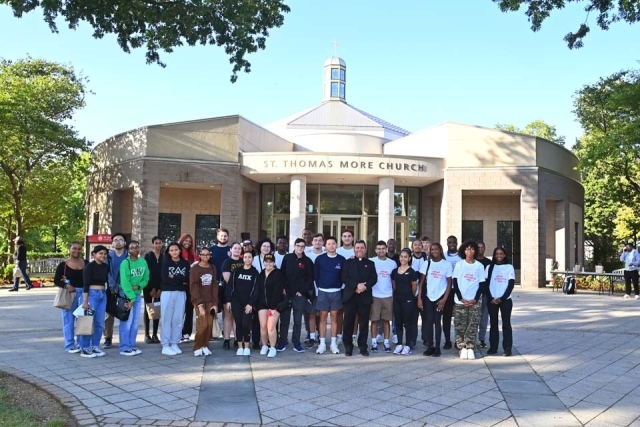
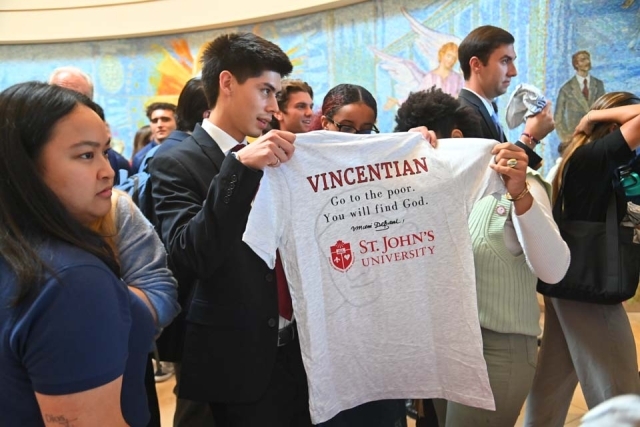
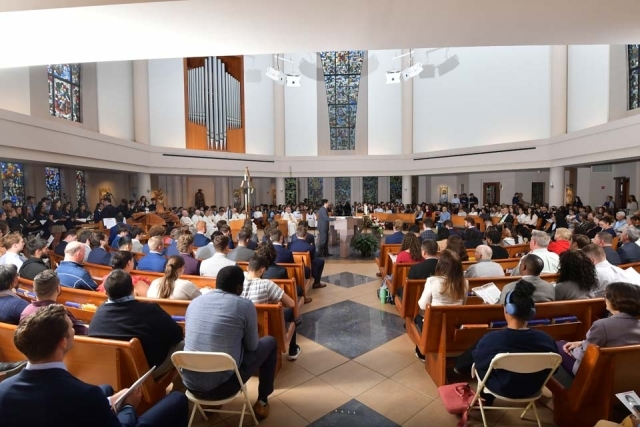
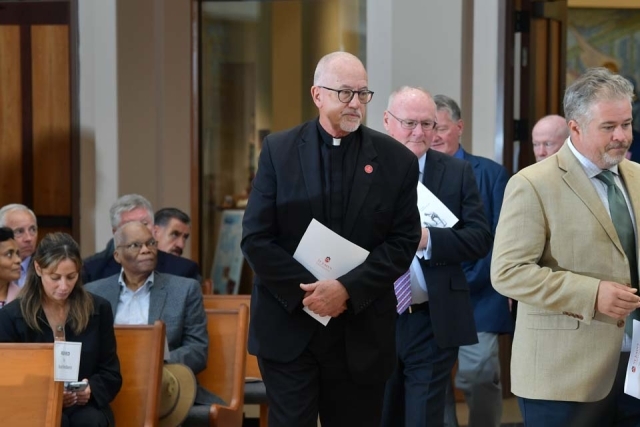
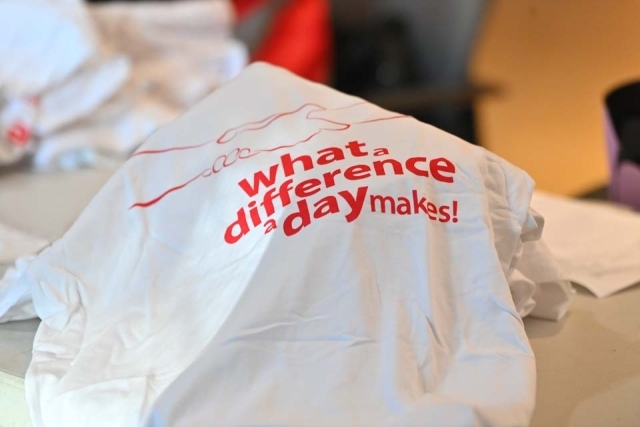
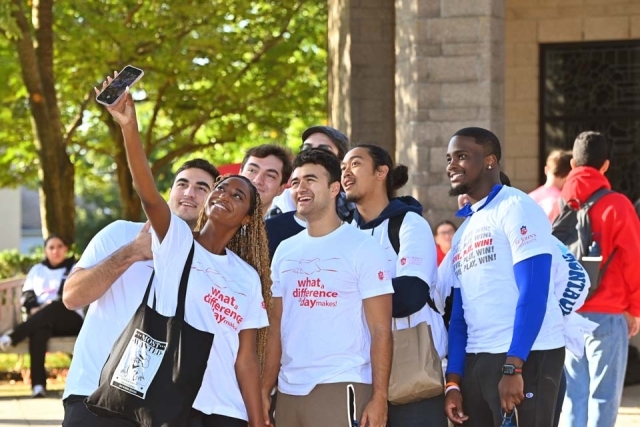
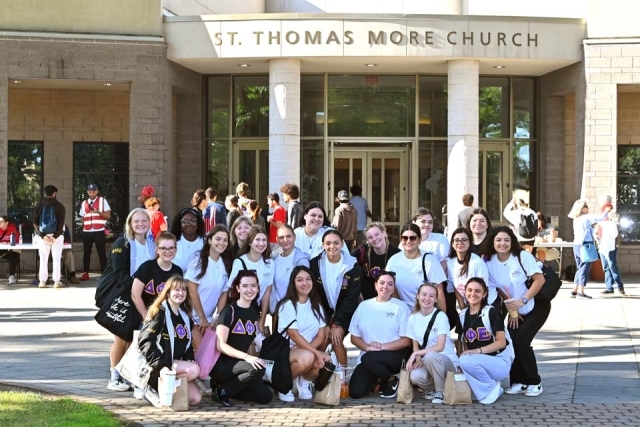
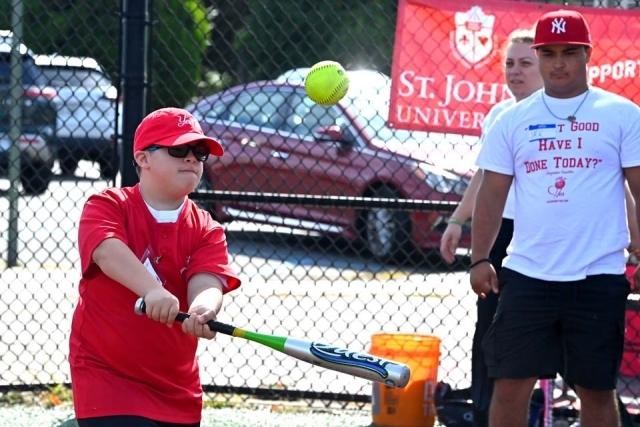
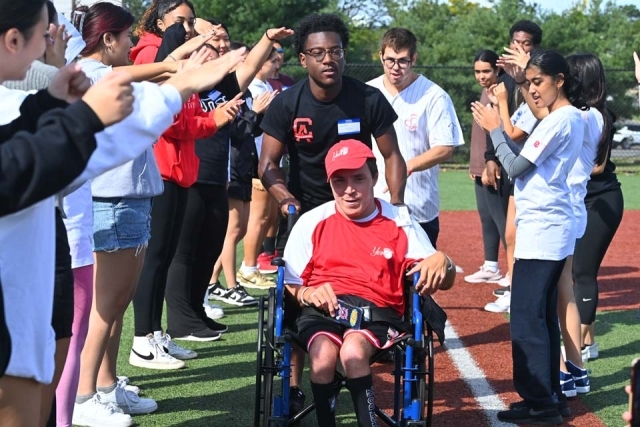
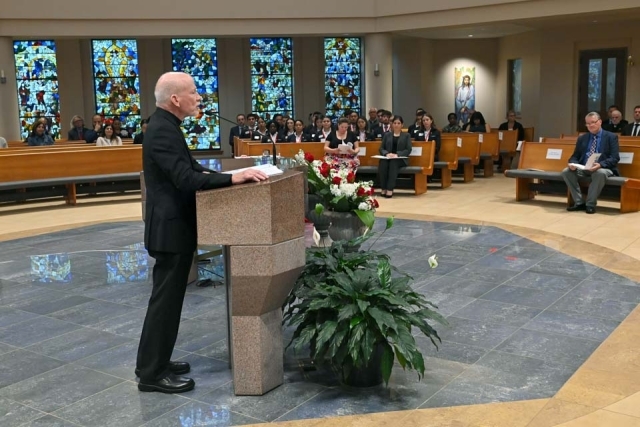
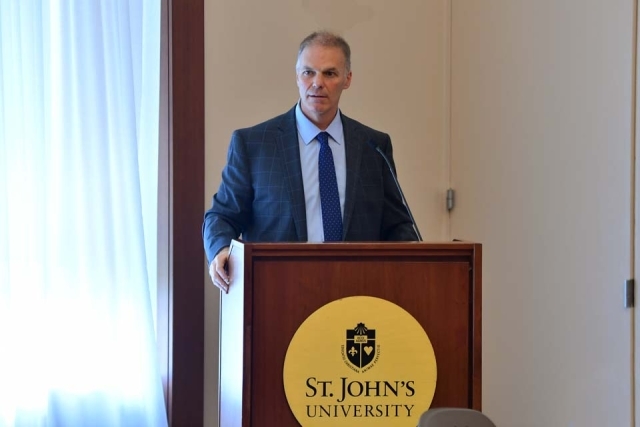
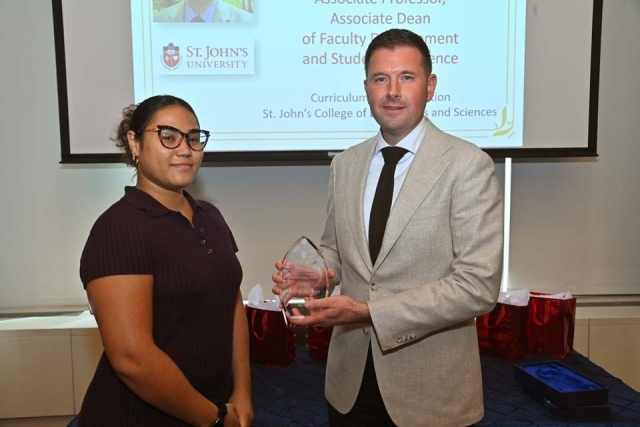
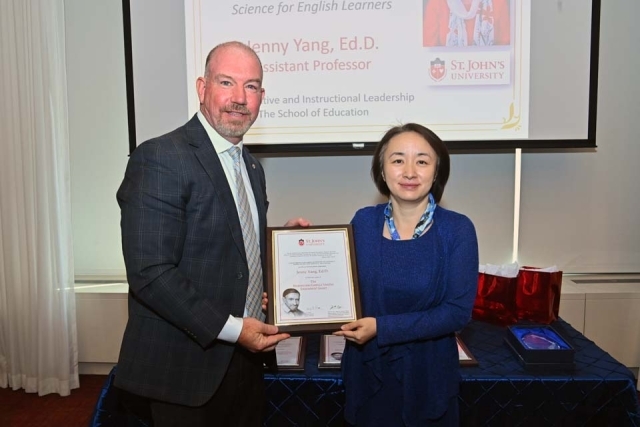
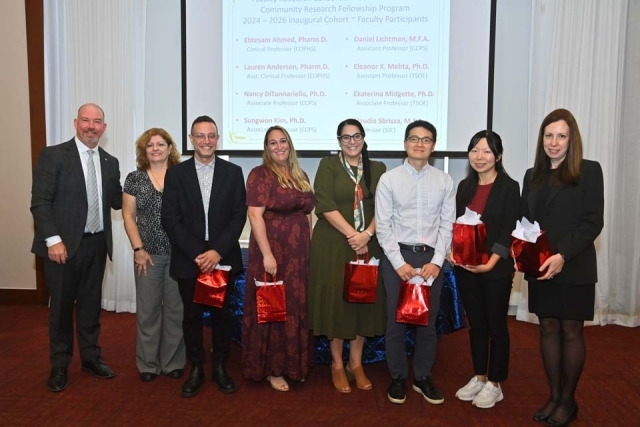














As the Congregation of the Mission (also known as the Vincentians) celebrates its 400th anniversary, St. John’s University’s annual Founder’s Week celebration highlighted the quintessential Vincentian question: What must be done?
Founder’s Week celebrates St. John’s University’s Vincentian heritage, combining lectures and prayerful reflections with tangible service opportunities, such as University Service Day. The Vincentian Convocation, which recognizes individuals and organizations that walk in St. Vincent’s footsteps, served as the week’s capstone event.
Speaking about the week’s theme, Rev. Patrick J. Griffin, C.M. ’13HON, Executive Director, Vincentian Center for Church and Society, noted the question draws appropriate attention to the service ministry of St. Vincent de Paul.
“When confronted with a situation of need, he would ask this question of himself and his collaborators,” Fr. Griffin explained. “Then, they would discover through the guidance of the Holy Spirit a response that gave real attention to those who were hurting. Through physical service, powerful lectures, and a call to prayer, our community asks and answers the question ‘What must be done?’ for our time and place.”
All St. John’s campuses celebrated the 23rd annual University Service Day on September 21, a day in which the St. John’s University family joins together to serve our communities locally, nationally, and globally. Service opportunities were offered both on campus and at sites throughout the local area.
Business Analytics major Shamarric Edwards always looks forward to Service Day. He volunteered with the Campaign Against Hunger at one of their urban farms, marking his third year participating.
“My favorite part about volunteering is gathering my friends to work toward a shared goal— helping our community. Service Day not only provides an opportunity to give back but strengthens the connections among volunteers. It’s a reminder that through our collective efforts, we can create a positive and lasting impact, while embodying the values of compassion and social responsibility.”
Hannah MacLean, a Government and Politics major, participated in her fourth and final Service Day this year at City Harvest, a New York City nonprofit that delivers food to needy families. “Upon arrival, we were met with the friendly faces of volunteers who directed us into an assembly line packing grocery carts and bags to more than 450 locals from the area. As a nonnative New Yorker who came to St. John’s from out of state, service experiences like this are what make me feel so connected to New York City and take pride in being a New Yorker.”
Jaryd Miles Buendia, a Biology major and member of the President’s Society, also volunteered with the Campaign Against Hunger, where his group set out to revitalize community farmland. “Our impact was put into greater perspective, having learned from the site manager that the site we were at was one of several that support more than 14,000 families in the local community. I was most interested in this specific opportunity because I could connect it to the food distribution volunteering I used to do in my hometown in California. It was such a rewarding experience that brought us closer to our peers and the people in our surrounding community.”
Several lectures were held throughout Founder’s Week that examined the theme through different lenses. During his September 24 lecture, “Healing our Rifts: A Vision for Health Justice,” Dave A. Chokshi, M.D., former Commissioner of the New York City Department of Health and Mental Hygiene, discussed the artificial walls between health-care organizations and public health systems that often disproportionately affect Black and Brown people in negative ways.
“This question, ‘What must be done?’ is what I’ve been meditating on as well for these last two years, trying to metabolize the lessons of the pandemic into productive paths forward,” Dr. Chokshi told his audience.
He added, “If we remember the COVID-19 pandemic properly and precisely, we will recognize it as a seismic event that resulted in unfathomable loss and human suffering. However, if the pandemic were an earthquake, we must examine the tectonic plates underlying that suffering: poverty, racism, tribalism, and the lack of trust, social cohesion, and human connection across communities. We require fresh approaches and different ways of organizing groups for purpose, particularly groups of people spanning different lived experiences and generational boundaries.”
Essential to this project, Dr. Chokshi continued, “are new leaders who are able to imagine and forge connections across seemingly disparate realms, as I know St. John’s is trying to do through the new St. Vincent Health Sciences Center. I want to be very clear for all the students here that when I say new leaders, I’m talking about each of you, because it will take a multigenerational and transdisciplinary approach to leadership.”
On September 25, Dylan Corbett, Founder and Executive Director of the Hope Border Institute, a research, advocacy and humanitarian action organization addressing US–Mexico border issues based in El Paso, TX, detailed the organization’s efforts to care for migrants consistent with Catholic Social Teaching in a discussion, “Migration in a Hopeful Key.”
He called for a fresh understanding of migration that does not see the issue as a crisis, but as an opportunity to live out the Christian message. “Too often we use the language of crisis to talk about the border,” Mr. Corbett said. “I invite you to stop using that word. Those traveling through the Americas northward are held hostage by a narrative of crisis that migration at the border represents a threat or insufferable challenge to Americans. This is calculated and has enforced upon us, emotionally and conceptually, all the things that we cannot do. It’s a straitjacket that has disabled action.”
He added, “When we make their situation, their struggles, and their dreams, our own, we reach a sacred place,” he continued. “And this becomes transformative for us. The encounter with the ‘other’ is an act of love in favor of justice for the common good of all, especially the poor.”
Over 500 members of the St. John’s community attended a special Mass held on September 27 celebrating the Solemnity of St. Vincent de Paul in St. Thomas More Church on the Queens, NY, campus. During his homily, Rev. Aidan R. Rooney, C.M., M.Div., M.Th. ’78NDC, Executive Vice President for Mission, told the congregation that St. Vincent’s foundation of the Congregation of the Mission is perhaps his most important legacy.
During the Mass, Rev. Brian J. Shanley, O.P., President of St. John’s, blessed the student leaders of various organizations, and Fr. Rooney told the assembly that their role was to “discover God’s will. Just as God has a plan for the individual, God has a plan for the organizations we lead.” The drive to base decisions on the will of God is what distinguishes Vincentian leaders, Fr. Rooney stressed.
“I think it’s not too strong to say that if Vincentian organizations wish to survive, it will only be because our leaders—you—have the inner conviction that you must discern in order to make decisions, and act according to values.”
Founder’s Week concluded with the Faculty Research Luncheon and the Administrators and Staff Luncheon, both held on September 30. The Faculty Research Luncheon, cosponsored by the Faculty Research Consortium (FRC) and the Office of University Mission, shined a light on faculty projects conducted in the spirit of St. Vincent de Paul.
Keynote speaker Shruti Deshpande, Ph.D., Associate Professor and Director of the Audiology Program, Department of Communication Sciences and Disorders, St. John’s College of Liberal Arts and Sciences, discussed the challenges presented by community-based research, and its rewards.
In 2023, Dr. Deshpande began a two-year study into cultural and economic disparities in the identification of hearing issues in young children in the area, funded in part by an FRC grant. “I wanted to be part of a process where research was guided by the community’s needs, where it was inclusive and equitable,” Dr. Deshpande said. “The goal is to combine knowledge and action with social change.”
Joseph E. Oliva, Esq. ’91CBA. ’94L, Senior Vice President and Chief Operating Officer, spoke to administrators and staff about concrete ways St. John’s addresses this year’s Founder’s Week theme. “You have to be aware of what it is that needs to be done,” Mr. Oliva stressed. “We need to be aware that there’s a need. The suffering of others can become invisible to us, especially the poor and marginalized.”
In asking what must be done, “how we do the ‘what’ matters,” Mr. Oliva observed. “How we execute matters.” Among Vincent’s great gifts was his ability to organize the effort of serving the poor, he noted. “To follow Vincent requires this need to set up effective strategies to address systemic issues. It’s not about ‘feel good’ moments. It’s about actually being able to address the issues.”
Tamein Haynes, Senior Secretary, The School of Education, an employee of less than two years, told Mr. Oliva she was inspired by two colleagues to do service and recently joined the Vincentian Mission Certificate program. “It wasn’t just them; there are other people who also influence others here. I think we can get caught up in our own stuff, but there are a lot of inspirational people at St. John’s.”
Related News
Vincent’s Table Brings Dignity and Support to Students Facing Food Insecurity
Food insecurity among US college students is a rising problem. About 3.8 million college students experienced food insecurity in 2020 and it has only grown steadily worse.
President’s Dinner Raises $4 Million
St. John’s University’s 28th Annual President’s Dinner raised a record-tying $4 million in student scholarship aid—but that is not the entire story. According to Rev. Brian J. Shanley, O.P., President...
Examples to Imitate: St. John’s Recognizes Alumni Who Embody its Core Values at Convocation
Capping a festive day that included St. John’s StormFest celebration, the University honored a select group of its best and brightest graduates during the annual Alumni Convocation.
